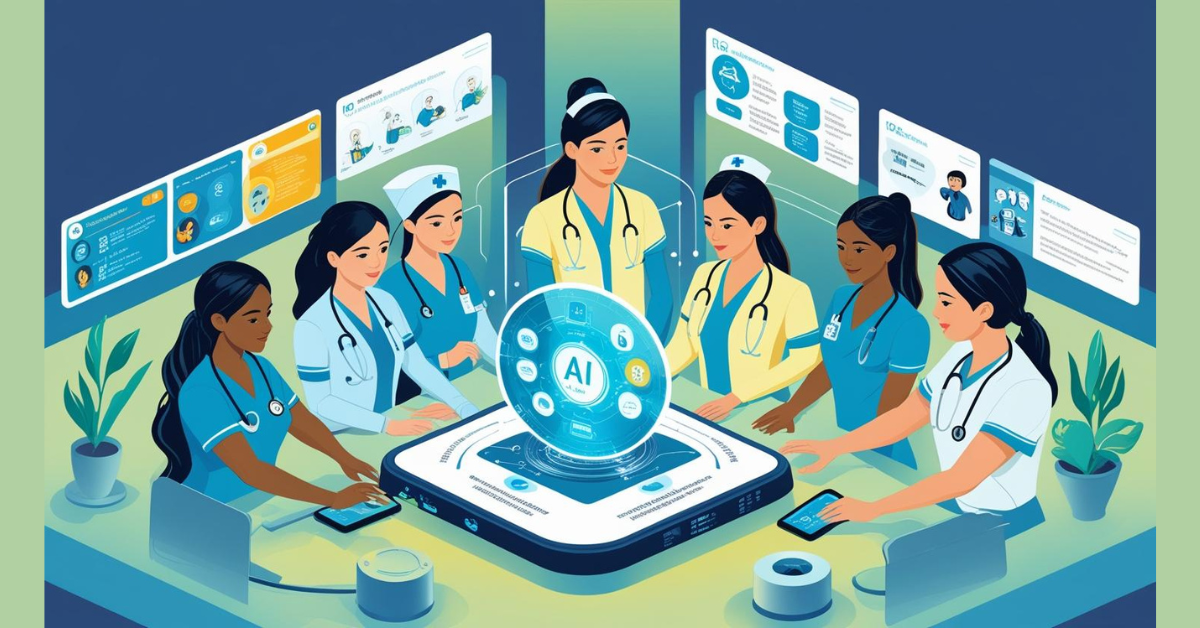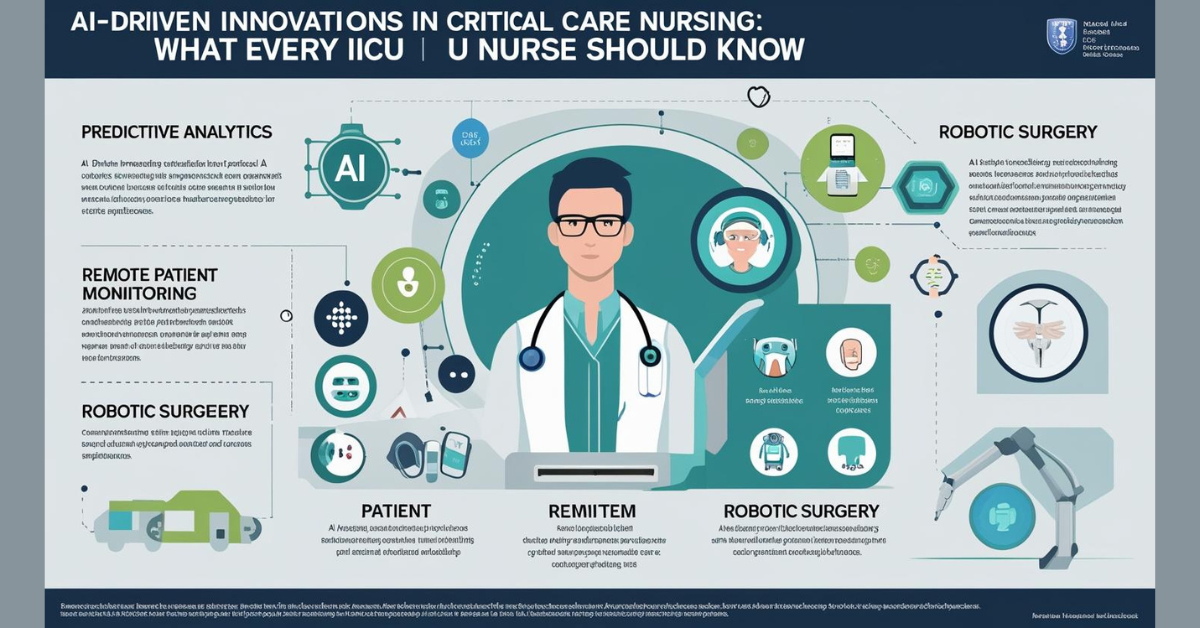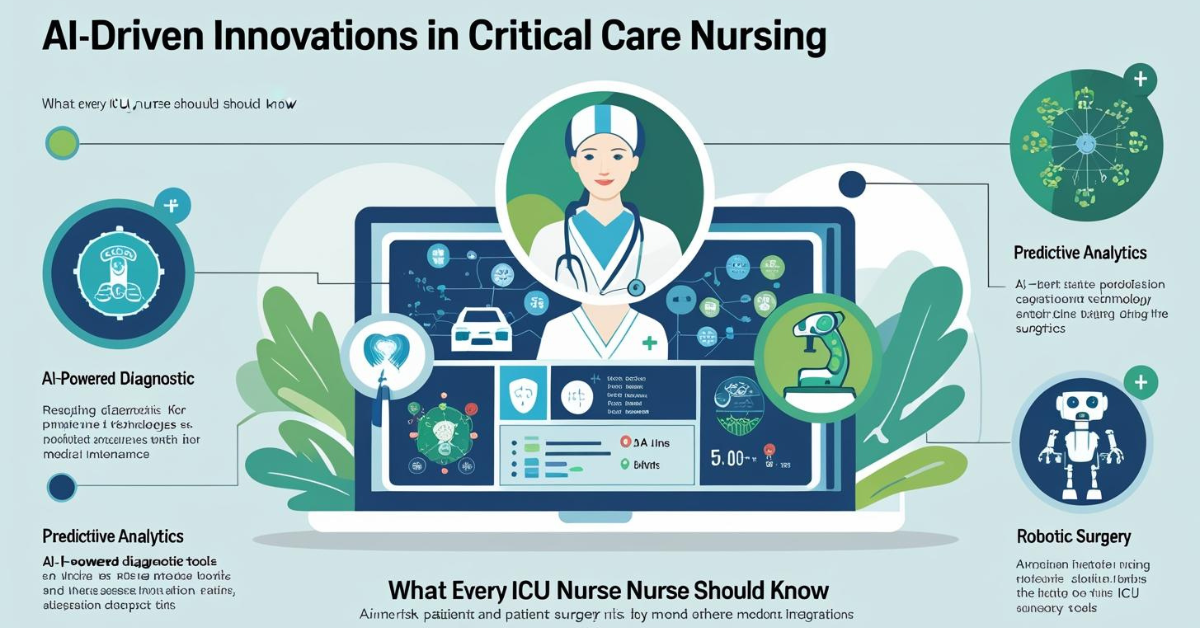The AI-Driven Innovations in Critical Care Nursing What Every ICU Nurse Should Know. Understanding AI Concepts: Nursing staff should have a basic understanding of AI concepts, including machine learning, natural language processing, and data mining. This knowledge helps them assess the capabilities and limitations of AI tools.
The AI-Driven Innovations in Critical Care Nursing: What Every ICU Nurse Should Know
AI techniques in intensive care offer significant benefits, including real-time data analysis for early detection of deteriorating patient conditions, automation of routine tasks, and improved clinical experience.
Nursing staff should be trained in procedures such as central venous catheter placement, intravenous medication administration, and mechanical ventilation management. Additionally, intensive care nursing staff must be able to interpret complex medical data.
This includes analyzing laboratory results, electrocardiograms, and imaging studies. Also, the benefits of intensive care : Compassion, communication (with patient and family), consideration (towards patients, family and colleagues) and conflict prevention, comfort: avoiding suffering, attention (avoiding injuries), consistency, closure (ethics and interruption of care).
Key AI Innovations Currently Transforming ICU Practice
1. Clinical Decision Support Systems (CDSS)
Artificial intelligence (AI) and gadget learning (ML) are swiftly reworking medical choice aid structures (CDSSs) in in depth care units (ICUs), wherein significant quantities of real-time statistics gift each and possibility and an assignment for well-timed medical choice-making.
AI‐pushed medical choice aid structures stand out as an example. These structures examine affected person statistics, provide evidence‐primarily based totally hints and help nurses in attaining specific diagnoses and remedy plans. These structures assist nurses make extra knowledgeable choices with the aid of using processing complicated affected person statistics in real-time.
2. Early Warning Systems and Predictive Analytics
This cohort look at compares three proprietary synthetic intelligence early caution rating and three publicly to be had easy aggregated weighted rankings for figuring out medical deterioration in hospitalized patients. These AI-powered structures can stumble on diffused adjustments in affected person situations earlier than they grow to be clinically apparent.
3. Sepsis Prediction and Management
Artificial intelligence (AI) is more and more implemented in a huge variety of healthcare and Intensive Care Unit (ICU) regions to serve—amongst others—as a device for sickness detection and prediction, in addition to for healthcare resources` management. Since sepsis is an excessive mortality and unexpectedly growing organ disorder sickness afflicting hundreds of thousands in ICUs and costing large quantities to treat, the place can enjoy the use of AI gear for early and knowledgeable analysis and antibiotic administration.
What ICU Nurses Need to Know About Implementation
Understanding AI’s Role in Patient Care
Usually, in in depth affected person care, the assignment of AI structures is to offer threat estimates and help in selections through imparting predictions, which then want to be understood, interpreted and established through clinicians. ICU nurses need to recognize that AI serves as a choice assist tool, now no longer a substitute for medical judgment.
Essential Competencies for ICU Nurses
As AI structures swiftly evolve, nurses discover themselves at the leading edge of this virtual transformation, requiring new abilities in records analytics, virtual/AI literacy, and AI-augmented decision-making to make certain the ongoing shipping of high-quality, patient-targeted care.
How AI Enhances Nursing Practice
The look at highlights each nice and bad factors of this technological advancement. On the nice side, AI complements decision-making abilities with the aid of using supplying real-time statistics evaluation and early caution scores. This permits nurses to assume affected person desires and intrude proactively.
Practical Benefits for ICU Nurses
Workflow Optimization
This paper specializes in the results of Artificial Intelligence (AI) for the nursing workforce, inspecting each the possibilities provided with the aid of using AI in relieving nurses of recurring obligations and allowing higher affected person care, and the capability demanding situations it poses. The dialogue highlights the releasing of nurses` time from administrative duties, taking into account greater affected person interplay and expert development.
Resource Management
The capability for fee financial savings with AI implementation is likewise discussed, consisting of enhancing workflow efficiencies, decreasing administrative costs, and enhancing healthcare outcomes. This performance permits nurses to attention extra on direct affected person care.
Current Challenges and Considerations
Implementation Barriers
Major boundaries to large powerful software of AI procedures to the real-time care of the significantly sick consist of technical integration challenges, schooling requirements, and gadget interoperability issues.
Despite those advantages, clinicians had been sluggish to undertake AI into scientific practice. This highlights the want for correct schooling and extrudes control strategies.
The Human Factor
This overview investigates the connection among synthetic intelligence (AI) use and the function of nurses in affected person care. AI exists in fitness take care of medical selection support, disorder management, affected person engagement, and operational development and could keep growing in popularity.
Future Implications for ICU Nursing
Evolving Role of Nurses
It is anticipated that synthetic intelligence (AI) will rework nursing throughout all domain names of nursing practice, together with administration, scientific care, education, policy, and research. ICU nurses have to put together for an evolving function that emphasizes AI collaboration and interpretation.
Transformative Opportunities
Artificial intelligence is an increasing number of influencing healthcare’s, presenting transformative possibilities and demanding situations for nursing practice. The key knows a way to leverage those gears efficiently whilst retaining the human factors of nursing care.
Practical Recommendations for ICU Nurses
- Develop AI Literacy: Understand the fundamentals of the way AI structures paintings and their limitations
- Learn to Interpret AI Outputs: Focus on information what AI predictions suggest and the way to validate them clinically
- Embrace Continuous Learning: Stay up to date on new AI equipment and technology being carried out to your unit
- Maintain Critical Thinking: Use AI as a help device whilst maintaining unbiased medical judgment
- Participate in Implementation: Get concerned in AI machine choice and implementation methods to your unit
The integration of AI in essential care nursing represents a massive shift in the direction of greater precise, efficient, and proactive affected person care. ICU nurses who recognize that technology and adapt to paintings collaboratively with AI structures can be higher placed to supply outstanding affected person effects whilst advancing their expert practice.
Read More:
https://nurseseducator.com/didactic-and-dialectic-teaching-rationale-for-team-based-learning/
https://nurseseducator.com/high-fidelity-simulation-use-in-nursing-education/
First NCLEX Exam Center In Pakistan From Lahore (Mall of Lahore) to the Global Nursing
Categories of Journals: W, X, Y and Z Category Journal In Nursing Education
AI in Healthcare Content Creation: A Double-Edged Sword and Scary
Social Links:
https://www.facebook.com/nurseseducator/
https://www.instagram.com/nurseseducator/
https://www.pinterest.com/NursesEducator/
https://www.linkedin.com/in/nurseseducator/
https://www.researchgate.net/profile/Afza-Lal-Din
https://scholar.google.com/citations?hl=en&user=F0XY9vQAAAAJ



I do not even know how I ended up here, but I thought this post was great. I don’t know who you are but certainly you’re going to a famous blogger if you aren’t already 😉 Cheers!